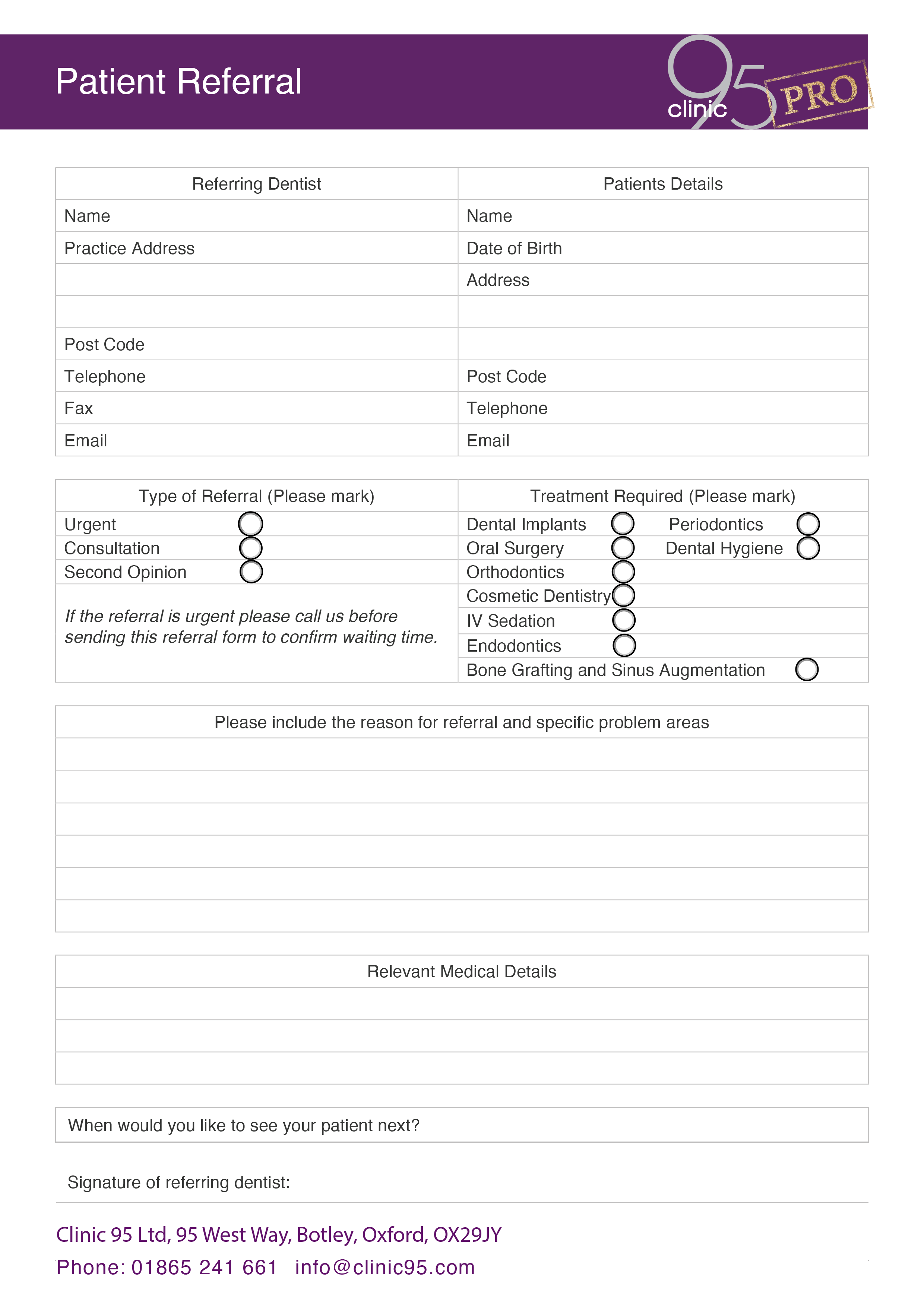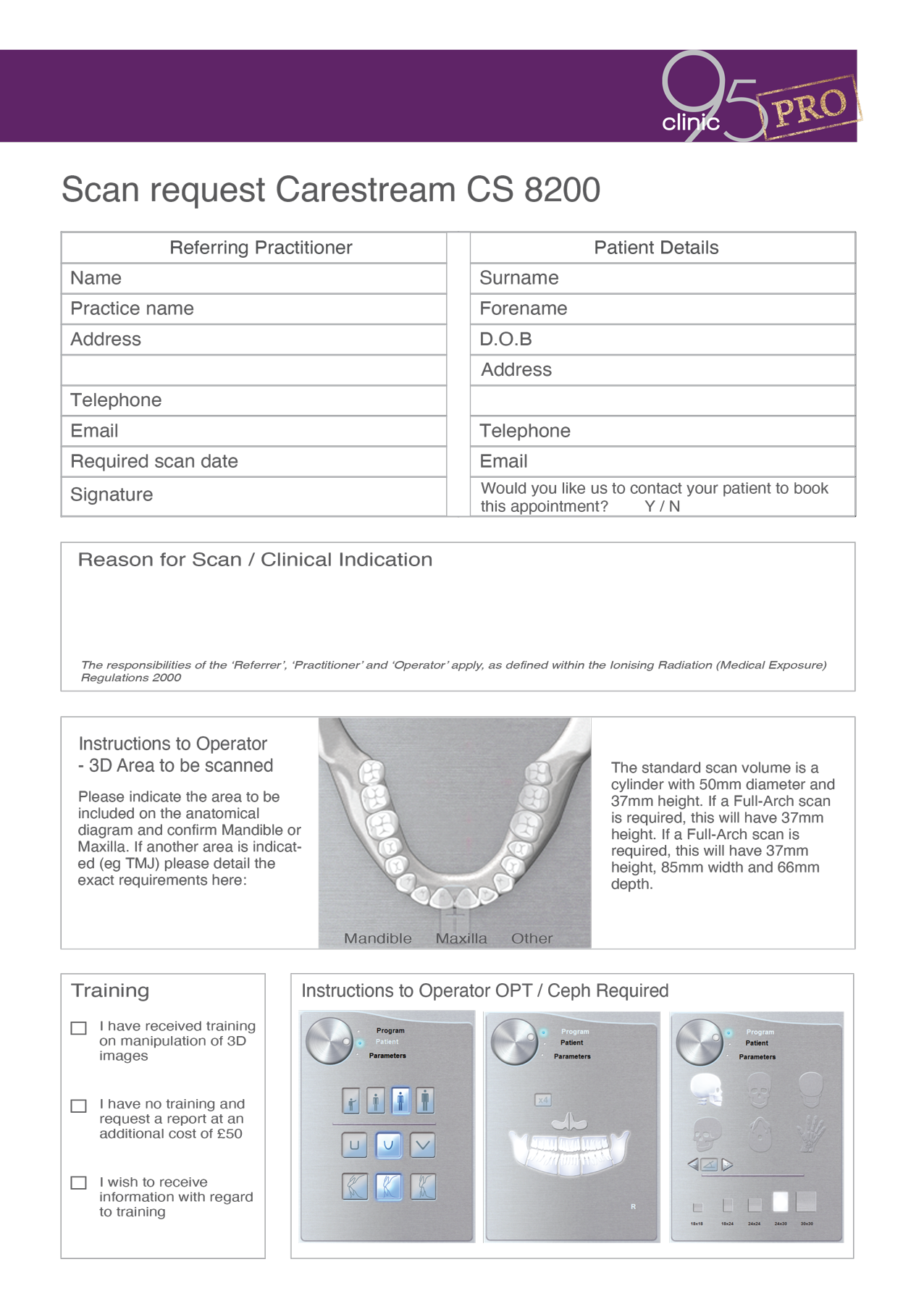Referrals
We welcome all types of referrals for implantology at Clinic95.
Here, Maria Hardman and John Davies explain more.
We accept all types of referral and can work with you in multiple ways:-
- Full surgery and restorative
- Surgery only
- All types of implants from single implants to SKY Fast & Fixed teeth in a day
- Planning and smile design
- Surgery observation and training
- Mentoring for you, your nurses and technicians.
We’re happy to customise and work with you at any level.
Regardless of your requirements, we’ll making the referral process easy for you.


|
Click here to download or print the patient referral form |
Click here to download or print the scan request referral form |
Please contact us if you would like us to email you a word version of the patient referral form to fill out electronically: Contact us

"I think Clinic95 is quite unique in a way. It's visionary"
~ Ed Attenborough, Attenborough Dental
"I know that I'm in safe hands when I refer my patients to Maria for the work"
~ Justyn Whitlock, Rex Dental
"The practice is stunning"
~ Dipesh Kothari, Woodlane Dentistry
Whatever aspect of implantology you’re interested in, contact manager@clinic95 to have a chat.
Deciding on implants: The questions your patient may ask
1. What are implants?
Implants are specially made posts that replace the roots of any missing teeth. They are used to support a new crown, a fixed bridge or a denture.
bredent implants are made from titanium, a strong and lightweight material which has been shown to be compatible with the body and safe for use. For patients who do not wish to have a metal implant, we also offer a zirconia implant called whiteSKY.
2. Are implants dangerous?
bredent implants are made from titanium which is almost never rejected by the body. There are no reports of this material being linked to the cause of cancer or any life- threatening disease.
For patients who do not wish to have a metal implant, we offer a zirconia implant called whiteSKY.
3. Can anyone have implants?
Unfortunately, just having missing teeth does not automatically mean a patient is suitable for dental implants. We need to look at the following factors:
- General health
- Condition of current teeth and gums
- Ability to maintain a high level of oral hygiene
- Amount of bone in the patients mouth
Is the patient’s general health satisfactory?
The patient’s health will need to be assessed as part of an initial consultation. The two most common medical threats to consider are
- whether the patient smokes
- if the patient has diabetes.
If a patient has one of these, the risks of failure are higher and patients need to be aware of this.
What is the general condition of the mouth?
The remainder of the teeth and gums need to be stable for the dental implants to be successful. If the patient has any dental decay, broken teeth or gum disease, these will need to be treated first before implants are placed. Placing implants in a mouth where there are other untreated dental problems can cause implants to fail.
Can the patient maintain a healthy mouth?
The success of implants can depend on whether the patient will be able to keep their teeth and gums clean. Advice on cleaning techniques for the patient’s current teeth and the implants will be given to the patient and they will need to commit be to follow the advice.
Patients with other medical risk factors can often have implants successfully if they can maintain a very healthy mouth.
Is there sufficient quantity and quality of bone?
Without the right amount of bone in the right place, it is difficult to place implants. X-rays and CT scans will be used to assess the amount of bone. If there isn’t enough bone, a range of bone grafting techniques can be used.
4. Why do we need to replace missing teeth?
- For chewing - our teeth are an important part of our digestive system as they’re needed for chewing food.
- For speech – our teeth play a role in how we speak.
- Appearance – teeth play a part in the way we look and feel about ourselves
5. Is there an age limit to having implants?
No. You can be too young for implants but age itself is not a barrier. A patient’s health is the most important criteria. After general health, the most important criteria is probably whether or not there is sufficient quality and quantity of bone.
6. What guarantee do we have and what is the success rate?
Though no one can ever guarantee success, the procedure has been very well tested and has a success rate of 90-95% in general. Some implants have been monitored for more than 30 years. The success rates given for implants are often thought to be a higher success rate than other treatments such as root canal treatments.
7. What are the advantages over conventional replacements?
Besides implants, there are two main conventional methods for replacing missing teeth; bridges and dentures.
Although either can serve patients well, implants provide
- permanent fixed teeth which you don’t need to remove every day
- better support
- more comfortable and stable replacement teeth
- better chewing efficiency
- permanent fixed teeth without trimming your own natural teeth for support
- a solution for slowing down the shrinkage of our jawbone which occurs as a result of tooth loss.
Bridges usually involve sticking false teeth onto existing teeth. This may involve filing down healthy teeth to act as retainers which can compromise the health of these teeth. Bridges can only be provided when there are sufficient strong remaining teeth. They are likely to need replacing every 10 to 15 years.
Dentures are teeth attached to a plastic or metal plate. They have to be taken in and out every day for cleaning.
They may not always stay in place well if the shape of the gums and bone in the mouth is not appropriate.
8. How long does the procedure take?
This depends on how complex the case is but it usually ranges from one to two hours per implant. The procedure time will be discussed as part of a consultation. Patients might need to take a couple of days off work after the insertion of the implants. Each case will be different and will require individual assessments.
9. What is the actual procedure?
There are a number of way of placing and engaging an implant into the jaw bone. The procedure can be very quick – immediate implants, so completed in one session or can last a few months. This would depend on a number of factors including bone quality, health of the patient, age etc.
10. What are the known complications?
As in all surgical procedures there are reported complications. In implant dentistry, complications are mainly either due to a failure of the implant to integrate with the jaw bone, or due to damage to adjacent teeth. The chance is very small, and with careful pre-operative planning the risks are kept to an absolute minimum.
Where an implant does not integrate with bone, often, the site can be left to heal for a few months and the implant successfully reinserted.
Occasionally implants can still fail after several years of having worked well. There may be several reasons for this. Again, a thorough assessment and appropriate treatment plan is essential to minimise risks.
11. Can implants improve my appearance?
Yes.
- Implants can fill the gaps in a smile
- Implants enable patients to eat all types of food so they can eat well and feel healthy again
- Implants can completely change the shape of a patient's face – the treatment is often referred to as a Smile Makeover
12. What should I expect during surgery?
The procedure is normally carried out under local anaesthetic. For patients who are anxious, sedation can also be offered. During the surgery, the local anaesthetic and sedation practically eliminates all pain. After the surgery, there will be some discomfort, swelling or bruising but with the appropriate medication, it is usually manageable. However, it is important to note that different people can heal at different rates.
13. What is bone grafting associated with implants?
Successful placement of implants depends on the presence of bone of sufficient quality and quantity. This is not always present in every patient. A lack of bone is usually related to local factors such as how the gums healed after tooth extraction, rather than any general medical condition.
There have been great advances made in procedures to increase the amount of available bone - either by using bone from another area of the patient or by using a artificial substitutes. These grafting techniques are simple and often carried out at the time of implant placement. For areas where there is significant lack of bone more complex grafting procedures may also be carried out.
14. How much do implants cost?
It depends on the number of implants and any other procedures involved.
You'll find prices on our Costs page.


